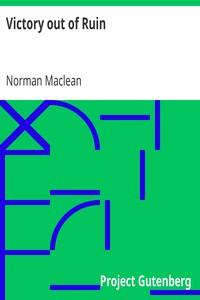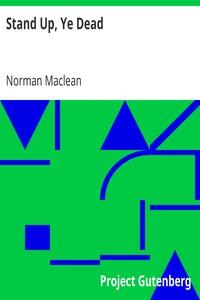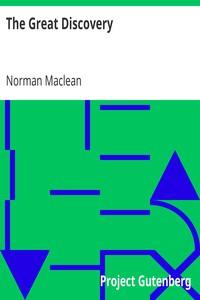|
|
Read this ebook for free! No credit card needed, absolutely nothing to pay.Words: 33969 in 5 pages
This is an ebook sharing website. You can read the uploaded ebooks for free here. No credit cards needed, nothing to pay. If you want to own a digital copy of the ebook, or want to read offline with your favorite ebook-reader, then you can choose to buy and download the ebook.

: Victory out of Ruin by Maclean Norman - Christianity Great Britain; Great Britain Social conditions 20th century@FreeBooksWed 07 Jun, 2023 The Thirteenth New Year's Feast 1 The Fourteenth New Year's Feast from the Auspicious Accession 78 The Fifteenth New Year's Feast after the Auspicious Accession 130 The Sixteenth New Year's Feast after the Auspicious Accession 199 The Seventeenth New Year's Feast after the Auspicious Accession 230 The Eighteenth New Year's Feast after the Auspicious Accession 253 The Nineteenth New Year's Feast after the Auspicious Accession 294 Index 301 THE THIRTEENTH NEW YEAR'S FEAST On the eve of Wednesday, the 23rd Rabi`u-l-awwal, 1027 , after the lapse of fourteen and a half gharis, the entrance of the Sun--that is, H.M. the Great Light--the Benefactor of the Universe, into the constellation of the Ram, took place. Twelve years had now passed from the august Accession of this suppliant at the throne of God, in prosperity, and the New Year began in joy and thanksgiving. On Thursday, 2 Farwardin, Divine month, the festival of my Lunar weighment took place, and the fifty-first year of the age of this suppliant at God's throne began with rejoicings. I trust that my life will be spent in the doing of God's Will, and that not a breath of it will pass without remembering Him. After the weighment had been finished, a fresh feast of joy was arranged, and my domestic servants celebrated the day with brimming cups. On this day Asaf K. , who held the rank of 5,000 with 3,000 horse, was favoured by the grant of 4,000 two-horsed and three-horsed troopers, and Sabit K. was raised to the office of Examiner of Petitions. I bestowed the post of the Artillery on Mu`tamid K. A Kachh horse had been brought as an offering by the son of Dilawar K. No horse so good as this had come into my establishment till I encamped in Gujarat, and as M. Rustam showed a great liking for it, I presented it to him. On the Jam were conferred four rings--viz., diamond, ruby, emerald, and sapphire--and two hawks. I also gave four rings--viz., ruby, cat's-eye, emerald, and sapphire--to Raja Lachmi Narayan . Muruwwat K. had sent three elephants from Bengal, and two of them were included in my private stud. On the eve of Friday I ordered lamps to be placed round the tank, and this had a very good appearance. On Sunday Haji Rafiq came from `Iraq, and had the good fortune to kiss the threshold, and laid before me a letter which my brother Shah `Abbas had sent with him. The aforesaid person is a slave of Mir Muhammad Amin K., the caravan leader, and the Mir had brought him up from his childhood. In truth, he is an excellent servant. He frequently visited `Iraq, and became intimate with my brother Shah `Abbas. This time he had brought tipchaq horses and fine cloth-stuffs, such that of the horses some were put into the private stables. As he is a skilful slave, and a servant worthy of favour, I honoured him with the title of Maliku-t-tujjar . On Monday I gave Raja Lachmi Narayan a special sword, a jewelled rosary, and four pearls for ear-rings. On Mubarak-shamba I increased by 500 horse the mansab of 5,000 personal and 1,000 horse held by Mirza Rustam; I`tiqad K. was promoted to a mansab of 4,000 and 1,000 horse; Sarfaraz K. was promoted to a mansab of 2,500 and 1,400 horse; Mu`tamid K. to the rank of 1,000 with 350 horse. On Anira'i Singh-dalan and Fida'i K., horses worth 100 muhars were conferred. As the guarding and administration of the Punjab had been entrusted to I`timadu-d-daula, I, at his request, promoted to the government of the said Subah, Mir Qasim, the Bakhshi of the Ahadis, who is related to him, and bestowed on him a mansab of 1,000 personal with 400 horse and the title of Qasim K. Before this I had given Raja Lachmi Narayan an `Iraq horse. On this day I conferred on him an elephant and a Turki horse, and gave him leave to go to Bengal. The Jam was dismissed to his native country with a present of a jewelled waist-sword, a jewelled rosary, two horses, one from `Iraq and the other a Turki, and a dress of honour. Salih, brother's son of the deceased Asaf Khan, was promoted to a mansab of 1,000 with 300 horse, and allowed to go to Bengal, and a horse was conferred on him. On this date Mir Jumla came from Persia, and had the good fortune to pay his respects. The aforesaid is one of the respectable Sayyids of Isfahan and his family have always been held in honour in Persia, and now his brother's son, Mir Riza, is in the service of my brother, Shah `Abbas, and has the rank of Sadr, and the Shah has married him to his own daughter. Mir Jumla had left Persia fourteen years before this, and gone to Golconda to Muhammad Quli Qutbu-l-mulk. His name is Muhammad Amin. Qutbu-l-mulk gave him the title of Mir Jumla. For ten years he had been his Mudar `Alaihi and his Sahib Saman . After Qutbu-l-mulk died, and the rule came to his brother's son, the latter did not treat the Mir properly, and so he took leave and hastened to his native country. The Shah, on account of his connection with Mir Riza, and the respect which he had for men of merit, showed much consideration for and kindness to him. He also presented fitting offerings, and passed three or four years in Persia, and amassed properties . As he several times represented that he wished to enter the service of this Court, I sent a farman and invited him. Immediately the farman arrived he severed his connections there, and set the face of loyalty towards this Court. This day he attained the honour of kissing the carpet, and produced as offering twelve horses, nine tuquz of silk cloths, and two rings. As he had come with devotion and sincerity, I conferred favours and kindness on him, and presented him with 20,000 darbs for his expenses and a dress of honour. On the same day I gave the post of Bakhshi of the Ahadis to `Inayat K. in place of Qasim K. I honoured Khwaja `Aqil, who is one of the old servants, with the title of `Aqil K., and presented him with a horse. On Friday, Dilawar K., coming from the Deccan, had the good fortune to kiss the threshold, and presented an offering of 100 muhars and Rs. 1,000. Baqir K., Faujdar of Multan, was promoted to a mansab of 800 personal and 300 horse. Tijarat K. and Bahu'i, Zamindar of Multan, were honoured with the gift of elephants. On Saturday, the 11th, marching from Dohad with the intention of hunting elephants, I pitched at the village of Kara Bara . On Sunday, the 12th, the village of Sajara became the place of alighting. It is 8 koss from this place to Dohad, and 1 1/2 koss to the hunting-ground. On the morning of Monday, the 13th, I went to hunt elephants with a body of my private servants. As the grazing-place of the elephants is in a hilly country, with elevations and depressions, a passage is obtained with difficulty by one on foot. Before this, a large body of horse and foot had surrounded the jungle after the manner of a qamurgha, and outside the jungle, on a tree, they had prepared a wooden platform for me. On all sides of this they had arranged seats on other trees for the Amirs. They had got ready 200 male elephants with strong nooses, and many female elephants. On each elephant there were seated two elephant-drivers of the tribe of Jarga, whose special employment is the hunting of elephants, and it had been arranged that they should bring the wild elephants from the jungle into my presence, that I might witness the hunt. It happened that at the time when the men from all sides entered the jungle, in consequence of the thickness of the forest and the heights and hollows, the chain was broken, and the order of the qamurgha did not remain perfect. The wild elephants in bewilderment turned in every direction, but twelve male and female came to this side . As the fear was that they might escape, they drove in the tame elephants and tied them up wherever they found them. Although many elephants were not caught, at least two excellent ones were captured, very handsome in shape, of good breed, and perfect marks. As there is a hill in the jungle in which the elephants were, called Rakas Pahar, or demon hill, I called these two elephants Ravan Sar and Pavan Sar, these being the names of two demons. On Tuesday, the 14th, and Kam-shamba , the 15th, I halted. On the eve of Thursday, the 16th, I marched, and halted at the stage of Kara Bara. Hakim Beg, who is one of the household of the Court, was honoured with the title of Hakim K., and a sum of Rs. 3,000 was given to Sangram, a Zamindar of the hill country of the Panjab. As the heat was very great, and marching by day was to be avoided, I marched by night. On Saturday, the 18th, a halt was made in the parganah of Dohad. On Sunday, the 19th, the sun that bestows favour on the world attained the highest point in the constellation of Aries. On this day a great entertainment was held, and I sat on the throne. I promoted Shah-nawaz K., who held a mansab of 5,000, with the favour of 2,000 horse, of two and three horses. Khwaja Abu-l-Hasan, the Chief Bakhshi, was given a mansab, original and increased, of 4,000 with 2,000 horse. As Ahmad Beg K., of Kabul, who had obtained the governorship of Kashmir, had promised that he would conquer in the space of two years Tibet and Kishtwar, and the promised time had elapsed, and he had not fulfilled this service, I removed him, and promoted Dilawar K. Kakar to the Government of Kashmir. I gave him a dress of honour and an elephant, and sent him off. He also made a promise in writing that in the course of two years he would conquer Tibet and Kishtwar. Badi'u-z-Zaman, s. Shahrukh M. came from the jagir he held in Sultanpur, and had the good fortune to kiss the threshold. Having at this time honoured Qasim K. with a jewelled dagger and an elephant, I dismissed him to the Government of the Punjab. On the night of Tuesday, the 21st, I marched from the stage mentioned, and turned the reins of the army of prosperity towards Ahmadabad. As in consequence of the great heat and the corruption of the air I would have had to undergo much hardship, and would have had to traverse a long distance before reaching Agra, it occurred to me not to proceed at this hot season to the capital. As I heard much praise of the rainy season in Gujarat, and there was no report about the evil reputation of Ahmadabad , I finally conceived the idea of remaining there. Inasmuch as the protection and guardianship of God was in all places and at all times extended to this suppliant, just at this crisis news arrived that signs of the plague had shown themselves again at Agra, and many people were dying, my intention of not going to Agra, which had thrown its rays on my mind through Divine inspiration, was confirmed. The entertainment of Thursday, the 23rd, was held at the station of Jalod. Previously to this, the rule of coinage was that on one face of the metal they stamped my name, and on the reverse the name of the place, and the month and year of the reign. At this time it entered my mind that in place of the month they should substitute the figure of the constellation which belonged to that month; for instance, in the month of Farwardin the figure of a ram, and in Urdibihisht the figure of a bull. Similarly, in each month that a coin was struck, the figure of the constellation was to be on one face, as if the sun were emerging from it. This usage is my own, and has never been practised until now. On this day I`tiqad K. was promoted to the dignity of a standard, and a standard was also conferred on Muruwwat K., who was attached to Bengal. On the night of Monday, the 27th, the camp was pitched in the village of Badrwala, in the parganah of Sahra. At this stage was heard the voice of the koel . The koel is a bird of the crow tribe, but smaller. The crow's eyes are black, and those of the koel red. The female has white spots, but the male is all black. The male has a very pleasant voice, quite unlike that of the female. It is in reality the nightingale of India. Just as the nightingale is agitated and noisy in the spring, so is the cry of the koel at the approach of the rainy season, which is the spring of Hindustan. Its cry is exceedingly pleasant and penetrating, and the bird begins its exhilaration when the mangoes ripen. It frequently sits on the mango-trees, and is delighted with the colour and scent of the mango. A strange thing about the koel is that it does not bring up its young from the egg, but, finding the nest of the crow unguarded at the time of laying, it breaks the crow's eggs with its beak, throws them out, and lays its own in the place of them, and flies off. The crow, thinking the eggs its own, hatches the young and brings them up. I have myself seen this strange affair at Allahabad. On the night of Kamshamba , the 29th, the camp was on the bank of the Mahi, and the entertainment of Mubarakshamba was held there. Two springs appeared on the bank of the Mahi, that had very clear water, so much so that if a poppy-seed fell into them the whole of it was visible. All that day I passed with the ladies. As it was a pleasant place to walk about in, I ordered them to build a raised seat round each of the springs. On Friday I fished in the Mahi, and large fish with scales fell into the net. I first told my son, Shah-Jahan, to try his sword on them. After this I ordered the Amirs to strike them with the swords they had in their belts. My son's sword cut better than all of theirs. These fish were divided among the servants who were present. On the eve of Saturday, the 1st of Urdibihisht, marching from the above-mentioned stage, I ordered the mace-bearers and tawachiyan to collect the widows and poor people from the villages on the road and near it, and bring them before me, so that I might bestow charity on them with my own hand, which would be an occupation, and the helpless ones might also find grace. What better occupation could there be than this? On Monday, the 3rd, Shaja`at K. `Arab, and Himmat K., and other servants who belonged to the Deccan and Gujarat, had the good fortune to kiss the threshold. The holy men and the possessors of blessing who lived at Ahmadabad paid their respects to me. On Tuesday, the 4th, the bank of the river at Mahmudabad became the alighting place. Rustam K., whom my son, Shah-Jahan, had left in the Government of Gujarat, was honoured by paying his respects. The entertainment of Thursday, the 6th, was held on the bank of the Kankriya tank. Nahir K., according to order, came from the Deccan and raised the head of honour with the good fortune of prostrating himself before me. A diamond ring was presented to my son, Shah-Jahan, as part of the offering of Qutbu-l-mulk. It was of the value of 1,000 muhars, and on it there appeared three letters of equal size and of good form, such that they made the word Lillahi . This diamond had been sent, as it was reckoned one of the marvels of the world. In fact, veins and scratches are flaws in precious stones, but it was generally thought that the marks on this one were fabricated. Moreover, the diamond did not come from any celebrated mine. As my son, Shah-Jahan, wished that it should be sent to my brother, Shah `Abbas, as a souvenir of the conquest of the Deccan it was sent to the Shah along with other gifts. On this day I presented Brikha Ray bad-farush with Rs. 1,000. He is a Gujarati by origin, and is fully versed in the chronicles and circumstances of that country. His name was Bunta--that is, a sapling . It seemed to me that it was anomalous to call an old man Bunta, especially now that he had become verdant and fruit-bearing through the irrigation of our kindness. I therefore ordered that henceforth he should be called Brikha Ray. Brikha means "tree" in Hindi. On Friday, the 7th of the aforesaid month, corresponding with the 1st Jumada-l-awwal, at a chosen propitious hour, I entered the city of Ahmadabad with all enjoyment. At the time of mounting, my son of prosperous fortune, Shah-Jahan, had brought 20,000 charan, or Rs. 5,000, for the nisar , and I scattered them as I hastened to the palace. When I alighted there he laid before me by way of an offering a jewelled turra of the value of Rs. 25,000, and those of his officers whom he had left in this Subah also presented offerings. They altogether amounted to nearly Rs. 40,000. As it was represented to me that Khwaja Beg Mirza Safawi had reached the neighbourhood of the forgiveness of God--i.e., had died--at Ahmadnagar, I promoted to a mansab of 2,000 personal and horse, original and increased, Khanjar K., whom he had adopted as his son, and, indeed, held dearer than a son of his loins, and who was in truth, an intelligent, ambitious youth, and a servant worthy of patronage, and entrusted him with the charge of the fort of Ahmadnagar. In these days, in consequence of the great heat and the corruption of the air, sickness had broken out among the people, and of those in the city and the camp there were few who for two or three days had not been ill. Inflammatory fever or pains in the limbs attacked them, and in the course of two or three days they became exceedingly ill--so much so that even after recovery they remained for a long time weak and languid. They mostly at last recovered, so that but few were in danger of their lives. I heard from old men who resided in this country that thirty years before this the same kind of fever prevailed, and passed away happily. Anyhow, there appeared some deterioration in the climate of Gujarat, and I much regretted having come here. I trust that the great and glorious God, in His mercy and grace, will lift up this burden, which is a source of uneasiness to my mind, from off the people. On Mubarak-shamba , the 13th, Badi`u-z-zaman, s. Mirza Shahrukh, was promoted to the mansab of 1,500 personal and horse, and presented with a standard, and appointed faujdar of Sarkar Patan. Sayyid Nizam, faujdar of Sarkar Lucknow, was raised to the mansab of 1,000 personal and 700 horse. The mansab of `Ali Quli Darman, who was attached to the province of Qandahar, at the request of Bahadur K., the governor thereof, was ordered to be 1,000 personal and 700 horse. Sayyid Hizbar K. Barha was dignified with the mansab of 1,000 personal and 400 horse. I promoted Zabardast K. to the rank of 800 personal and 350 horse. On this day Qasim Khwaja of Dihbid had sent from Ma-wara'a-n-nahr by the hand of one of his tribesmen by way of supplication five tuyghun falcons. One died on the road, and four arrived at Ujjain in safety. I ordered them to hand over the sum of Rs. 5,000 to someone among them, that he might purchase and take with him whatever things would be agreeable to the Khwaja, and gave a reward of Rs. 1,000 to himself. At this time Khan `Alam, who had been sent as ambassador to the ruler of Persia, sent an ashyani falcon , which in the Persian language they call ukna. Outwardly one cannot distinguish between these and baz dami falcons by any particular mark, but after they have been flown the difference is clear. On Thursday, the 20th, Mir Abu-s-Salih, a relation of the deceased Mirza Yusuf K., came from the Deccan by order, and enjoyed the good fortune of kissing the threshold. He presented as an offering 100 muhars and a jewelled plume . Mirza Yusuf K. was one of the Rizawi Sayyids of Mashhad, and his family was always held in great honour in Khurasan, and just now my brother Shah `Abbas has given his daughter in marriage to the younger brother of the aforesaid Abu-s-Salih. His father, Mirza Atagh, was the head of the attendants of the mausoleum of Riza, the 8th Imam. Mirza Yusuf Khan, by means of the patronage of H.M. , had risen to nobility, and attained to the mansab of 5,000. Without doubt he was a good Mir, and held his many servants in good order. A number of relations gathered round him. He died in the Deccan. Although he left many sons, who obtained favours in consideration of former services, special attention was paid to the development of his eldest son. In a short time I advanced him to the rank of nobility. Certainly there is a great difference between him and his father. Free books android app tbrJar TBR JAR Read Free books online gutenberg More posts by @FreeBooks
: Stand Up Ye Dead by Maclean Norman - Great Britain Social conditions 20th century@FreeBooksWed 07 Jun, 2023

: The Great Discovery by Maclean Norman - World War 1914-1918 Great Britain; World War 1914-1918 Religious aspects World War I@FreeBooksWed 07 Jun, 2023
|
Terms of Use Stock Market News! © gutenberg.org.in2025 All Rights reserved.






